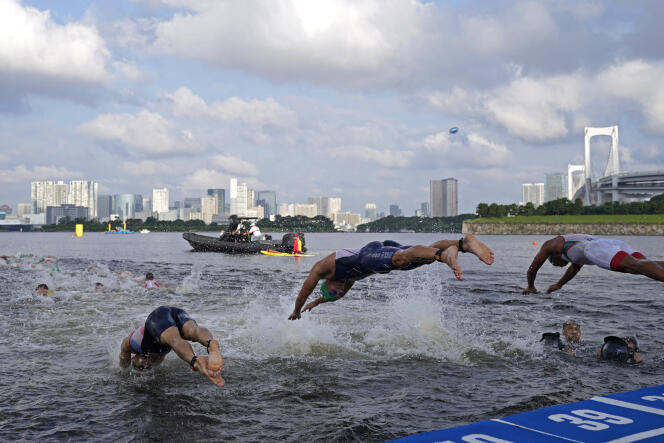


You need a strong stomach to be a triathlete. Behind the postcard image of urban races held in the world's most beautiful cities, the discipline has raised a number of health challenges. Pollution, rats, unidentified floating waste, heavy metals: Participants often swim in murky waters.
Pierre Le Corre recently paid the price. Since his victory on the July 30 stage of the world championships in Sunderland, England, the French swimmer has been suffering from persistent intestinal pain. "I was poisoned after ingesting water at the start. I take chlorine tablets, probiotics and sometimes Smecta [an antidiarrheal] before races to avoid this kind of situation, but even so, it happens regularly."
And he's not the only one: Fifty-seven athletes developed symptoms. A few days after the British event, water analysis readings showed that levels of Escherichia coli – a bacterium found in feces – were 39 times higher than normal.
Yet the athlete from Vannes, in northwestern France, is preparing to compete in the Seine during the Paris test event (August 17-20) – a dress rehearsal before next year's Olympic Games. Swimming in the river that runs through the capital? "Let's not kid ourselves, it's not great for your health," said the mixed relay world champion, who had already tasted these waves during the Paris triathlon in 2012. "But if they tell us we have a green light, I won't question it. We've got into the habit of keeping our mouths shut and going for it."
The problem mainly concerns competitions, most of which take place in urban areas. "When I first arrived, I was surprised to see where the races were organized, especially the swimming part," said Daniel Hirt, the French triathlon teams' doctor. "But you have to understand that, for the federation, it's not the same thing to organize the event in the heart of Paris, a stone's throw from the Eiffel Tower, or in the Creuse [one of the most rural areas in France]. So we have to find compromises."
World Triathlon, the discipline's global governing body, is finding compromising by introducing a water quality standard based on the most stringent European norms. Health awareness grew between 1998 and 2013, owing to the increasing number of cases of leptospirosis, a potentially fatal disease transmitted by rat urine. Through its doctor Claude Marblé, the French federation has played an active role in drawing up the international protocol.
From now on, before each event, organizers must measure the water's acidity (pH), record germ levels, and analyze algae. "If the waters are not categorized as very good quality, the swim must be canceled," stress World Triathlon's rules, signed in 2019.
You have 42.97% of this article left to read. The rest is for subscribers only.
